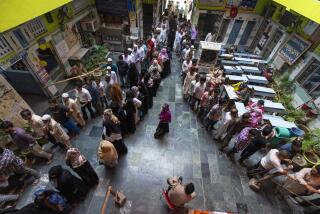India’s President Appeals for an End to Political Violence
- Share via
NEW DELHI — In an extraordinary address to the nation Saturday night, India’s figurehead president, Ramaswami Venkataraman, appealed for an end to rampant political violence that has claimed hundreds of lives in recent weeks, among them that of former Prime Minister Rajiv Gandhi. He warned that India will cease to be a democracy if bloodshed and vote fraud continue through this week’s crucial national elections.
The president traditionally speaks publicly only twice a year--on Republic Day, Jan. 26, and Independence Day, Aug. 15. Venkataraman’s unexpected televised speech underscored the depth of the turmoil threatening the world’s largest democracy.
“A country ceases to be a democracy where the will of the people is not reflected in the elections and where the sacred right to vote is deprived either by a dictator or by musclemen employed by unscrupulous politicians,” Venkataraman declared.
The president’s speech came as Indian voters prepare for voting in parliamentary elections interrupted by Gandhi’s assassination May 21 while he was campaigning in the south Indian state of Tamil Nadu.
Since then, dozens of other candidates and campaign workers have been assassinated, notably in the northern state of Punjab, where secessionist Sikhs are enforcing their call for a public boycott of the elections by killing candidates opposed to their cause.
Police confirmed Saturday that six people were killed, including two police bodyguards, in a bomb attack that just missed India’s deputy interior minister, Subodh Kant Sahay, who is campaigning for a parliamentary seat in Punjab’s war-torn district of Ludhiana. The bomb was detonated by remote control when Sahay’s car arrived, damaging the vehicle but leaving him only cut and bruised.
“Let the elections be fought with respect for human decency,” President Venkataraman declared in his appeal. “No words can be too strong to condemn the saboteurs of a peaceful election process.”
The president also called on the administration of caretaker Prime Minister Chandra Shekhar, whose three-month-old coalition government fell in March, to curb violence and corruption.
“Friends, the next rounds of polling will take place on June 12 and June 15, and I earnestly appeal to all political parties, individuals, government servants and the election machinery to ensure free and fair elections,” he said. “Let us demonstrate to the world that India is not only the largest but the best democracy in the world.”
But in a candid account of the trauma of the long campaign and, particularly, the first day of voting May 20, Venkataraman said he was deeply troubled by “disturbing reports of violence and electoral malpractices” in several parts of India, where at least 225 people have died in election violence.
“All of us abhor theft and look down on a thief socially,” the president said. “Our conscience must therefore be aroused when musclemen steal the fundamental right of a citizen to exercise his choice.”
Referring to a now-established practice in several states, where politicians hire criminal gangs to occupy polling places and stuff the ballot boxes on election day, Venkataraman said: “What the booth capturer does is, essentially, to rob his brothers and sisters of their inalienable right to vote. Parties that gain power through malpractices will not get the cooperation of the people.
“That a government which does not reflect the will of the people cannot last long is one of the lessons of history.”
Most analysts predict that the elections again will leave India with a Parliament in which no party has a majority. Such a result, which occurred in 1989 for the first time in India’s four decades of independence, would mean another fragile, coalition administration, which most Indians blame for the country’s present instability.
Gandhi’s Congress-I Party, which ruled India for all but 4 1/2 of its 44 years of independence, lost control for only the second time during those elections, and most analysts believe that a sympathy wave strong enough to propel the party to victory has not yet taken shape.
More to Read
Sign up for Essential California
The most important California stories and recommendations in your inbox every morning.
You may occasionally receive promotional content from the Los Angeles Times.













